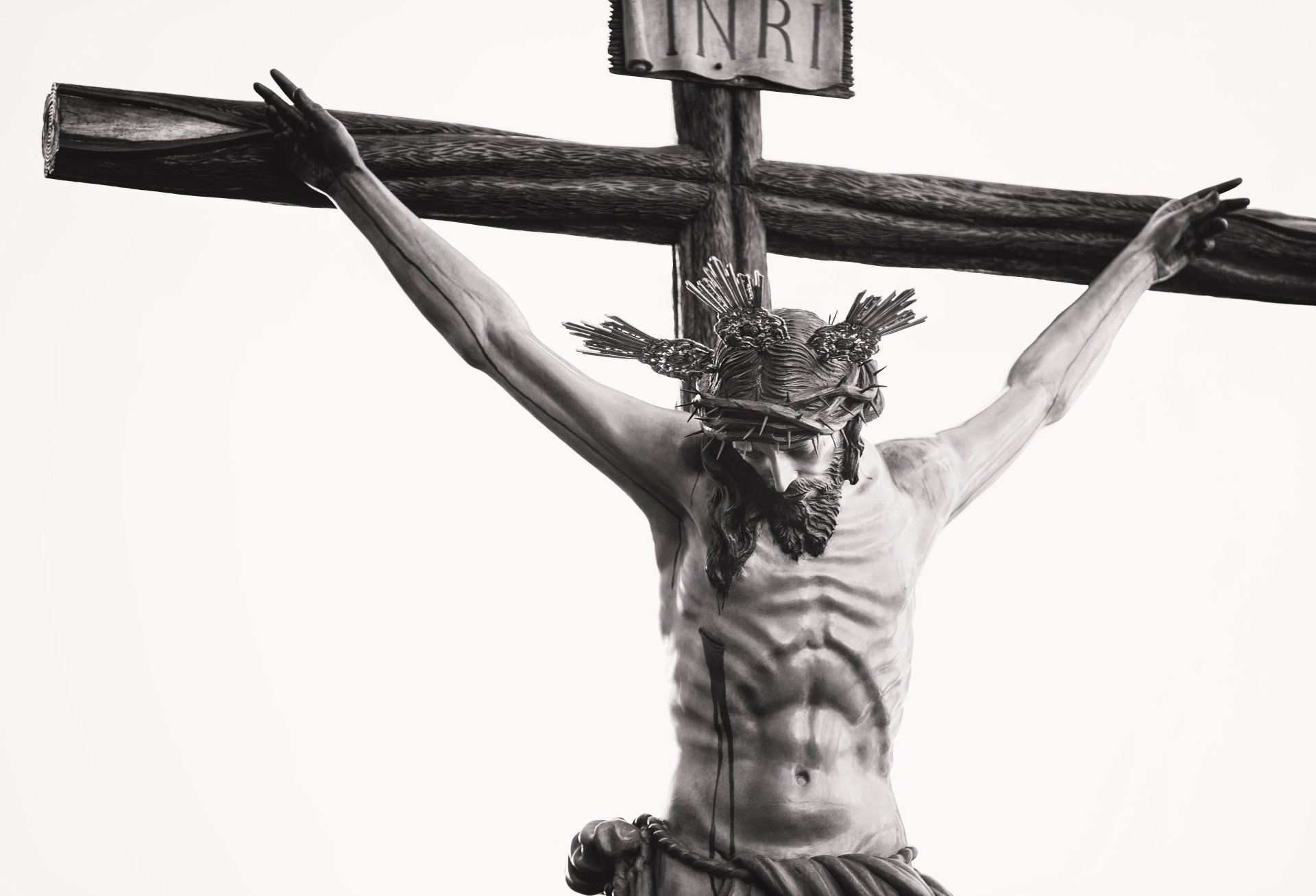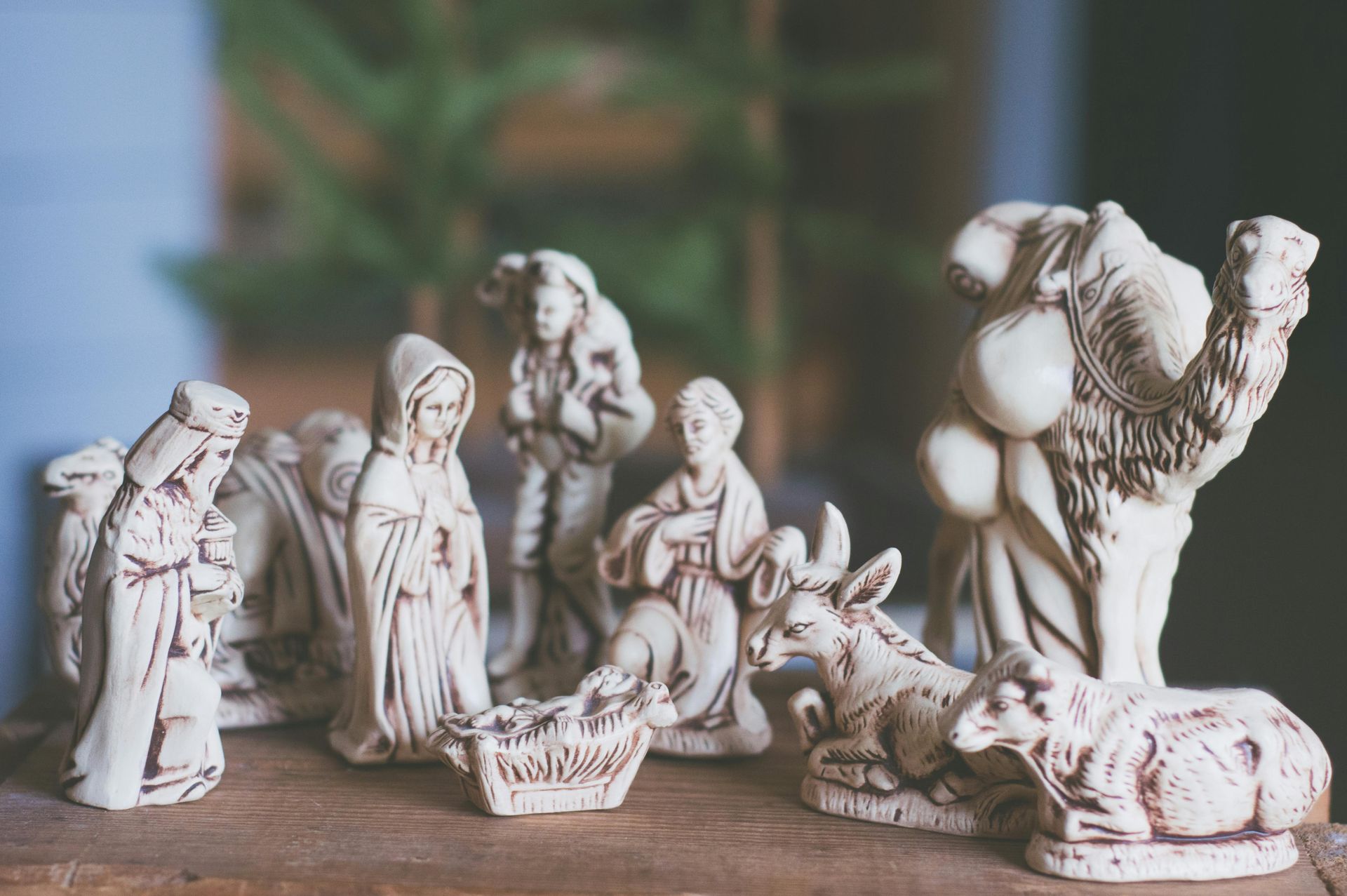Crucifix: SIL--A Symbol, An Invitation, A Lesson

Joke: "Get behind me, Satan!" A woman had bought a new dress that/ was very expensive. Her husband asked why she had been so extravagant. She replied, "The Devil made me do it." "Well," the husband asked, "Why didn't you say 'Get thee behind me, Satan!'" "I did," explained the wife, "But he said to me, it looked as good in the back as it did in the front.” So I bought it."
“Each player must accept the cards life deals him or her; but once they are in hand, he or she alone must decide how to play the cards to win the game,” Voltaire, a French writer, philosopher, and playwright said. God brings us into existence and grants us the grace and the gift of life, especially our free will to make a decision either to follow the Lord or not. How do we live our Christian life to achieve the kingdom of God, the moment at the age of reason that is seven? In seeing humans struggling with life, His Son decides to come to us in our human flesh to live a living example for us to follow. He comes not only to be a human being like all of us, except sin, but he also suffers and dies on the cross to give us life. His coming into this world will be meaningless if there is no resurrection! Therefore, he alone has a solution, a plan to help us achieve the kingdom of heaven after the resurrection from death! What is his plan for us? His plan is what is described in today’s Gospel which is his invitation, perhaps, to each one of us when we profess ourselves that we are Christians saying, “Whoever wishes to come after me must deny himself, take up his cross, and follow me.” Therefore, the crucifix is a SIL, not a sister-in-law, but it is a symbol, an invitation, and a lesson for each one of us to follow. Is the crucifix, a symbol of failure, of weakness, of ungodly? The crucifix will become a stumbling block, a failure, a weakness, or an ungodly substance for those who are allowed all these worldly pleasures block their minds from understanding and believing that Jesus Christ, though he is the Son of God, lowers himself to come to us in our human flesh to be like all of us, except sins, using the language of St. Paul. He suffered and died because of our sins, and he resurrected us to give us hope that one day, we will be resurrected which him in his heavenly homeland. Therefore, the crucifix is not a symbol of failure, weakness, or ungodly matter, but it is a great symbol for us to follow as an invitation from the Son of God himself when we learn to come after him, not to go ahead of him; to deny ourselves, not so attached to this earthly pleasures since we are created in this material world; and to carry our cross, not other’s cross! Is it easy to follow the invitation that Christ asked us to follow? St. Ignatius once said, “When I reflected on worldly thoughts, I felt intense pleasure; but when I gave them up out of weariness, I felt dry and depressed.” When I give up my drinking habit, especially this long Labor Day weekend, I might feel dry and thirsty. When I give up my smoking habit, I might feel dizzy and headache. When I give up being quick to judge, gossiping, using unkind words to others, cheating, and lying, perhaps, we have difficulty giving up. We have difficulty denying our attachment to what belongs to these earthly pleasures. How can we give up and take up our cross to follow Jesus Christ? Prayer is one of the ways.
Last Sunday, Peter, filled with the Holy Spirit, proclaimed that Jesus is Christ, the Son of the living God; and Jesus placed him as the head of the apostles, the Rock in whom He built his Church. But today, Jesus rebuked him and equated him as “Satan” because he is thinking as not God does, but as human beings do! What’s Peter thinking at the moment when he heard Jesus say that he has to go to Jerusalem to suffer and die, Peter, for some reason might not hear the words “and on the third day be raised”? Jesus does not only tell Peter and his disciples about his suffering and dying, but he also promises two very important things, “The Son of Man will come” and “he will repay everyone according to his conduct.” Like Jeremiah in today’s first reading couldn’t accept the suffering of being a prophet that in his anger and powerless, he gives up saying, “You duped me, o Lord, and I let myself be duped; you were too strong for me, and you triumphed.”
Just like the prophet Jeremiah, St. Augustine had the same experience. At the age of fifteen, he developed a theory, and in that theory, he discovered that there are sides within his inner self: one side is good, and the other is bad. When someone does something good, he does something good because the good side tells him to do so. When he does something bad, he does it because the bad side tells him to do so. This theory gives him peace and comfort, but it doesn’t last too long. In his Confession, Augustine revealed the moment of conversion, the moment that being duped like Jeremiah when he says, “At once I picked up the book of the New Testament and read at random from Romans 13:13 saying “Not in carousing and drunkenness, not in sexual excess and lust, not in quarreling and jealousy. Rather, put on the Lord Jesus Christ and make no provision for the desires of the flesh.” It is not that Augustine is unfamiliar with the Bible, he reads the whole Bible at an early age and memorizes word by word. But the Bible is just like a novel book that he finds nothing that can give him peace and hope for eternal life until that day. The Lord opens his deafness, gives sight to his blindness, and takes away the hardened stone of his heart to make him a new person, an instrument of God.
Did the Son of God choose to deny himself as God to come to us as human beings? Yes. He chose to vest on himself our very human flesh like all of us except sin. Did he choose to carry the cross, to suffer, and to die on the cross? Yes, he did choose it willingly as a human being, but why did he choose that way? Did he mean to give us an example to follow when he stated clearly in today’s Gospel, “Whoever wishes to come after me must deny himself, take up his cross, and follow me”? Just as Peter becomes a stumbling block when he rebukes Jesus saying, “God forbid, Lord! No such thing shall ever happen to you,” when our friends or even our loved ones become a stumbling block to asking us to enjoy the trip and forget attending Church on Sunday and holiday of obligation; to live our life without prayer; to cheat, to liar, and to gossip and still think that it’s fine because of life? If something or someone becomes a stumbling block for us in following the Lord Jesus Christ, do we have the courage and strength to stand for the truth and for what we believe in the Lord’s teaching and the Church’s teaching? What is the condition to become the followers of Jesus Christ, the Christians, and how can we fulfill that condition? The crucifix will only be a cross with a corpse on it and no more if we cannot see in it a symbol of life, an invitation for conversion, and a lesson to follow. May we have the strength and courage to come after the Lord, to take up our cross, and to follow him. The decision is always yours.









